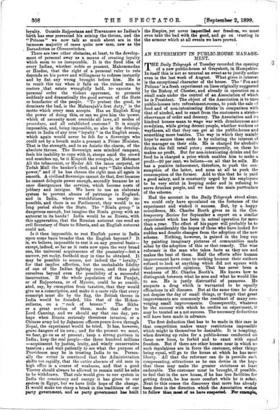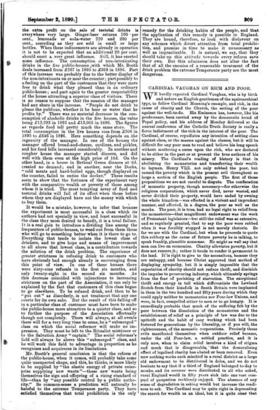AN EXPERIMENT IN PUBLIC-HOUSE MANAGE- MENT, E Daily Telegraph of
Tuesday recorded the opening of a new public-house at Grayshott, in Hampshire. In itself this is not so unusual an event as to justify notice even in the last week of August. What gives it interest is the exceptional character of the house. The Fox and Pelican' is a fresh experiment on lines originally suggested by the Bishop. of Chester, and already in operation on a small scale under the control of an Association of which he is President. The object of the Association is to turn public-houses into refreshment-rooms, to push the sale of food and of non-intoxicating drinks •in comparison with that of alcohol, and to exact from the customers a stricter observance of order and decency. The Association and its kindred houses mean to wage war with drunkenness and rowdyism, while giving decent people, whether workers or wayfarers, all that they can get at the public-house and something more besides. The way in which they mainly hope'to secure these ends is by enlisting the interest of the manager on their side. He is charged for alcoholic drinks the full retail price ; consequently, on these he makes no profit. But for non-intoxicating drinks and for food he is charged a. price which enables him to make a profit-20 per cent. we believe—on all that he sells. He has a positive inducement, therefore to push the con- sumption of the latter, and none at all to push the consumption of the former. Add to this that he is paid a good salary, and is constantly urged by his employers to be very strict in keeping order and in refusing to serve drunken people, and, we have the main particulars of the scheme. • Had the account in the Daily Telegraph stood alone, we could only have speculated on the fortunes of the experiment and wished it success. But, by a happy coincidence, Mr. Charles Booth gives us in the Con, temporary Beview for September a report on a similar experiment which has been in actual operation for more than a year. The effect of his paper will probably be to dash considerably the hopes of those who have looked for sudden and drastic changes from the adoption of the new scheme. Nothing, however, is gained in the long run by painting imaginary pictures of communities made sober by the adoption of this or that remedy. The wise reformer is the man who takes facts as they are and makes the best of them. Half the efforts after human improvement have come to nothing because their authors refused to look at anything which did not square with their preconceived opinions. That has never been a weakness of Mr. Charles Booth's. He knows how to distinguish between what he sees and what he would like to see. He is justly distrustful of panaceas. He suspects a drug which is warranted to be equally efficacious in all diseases. But at the same time he does not despise the day of small things, or 'forget that great improvements are commonly the resultant of many con- verging small improvements. Consequently, whatever be the success- with which he credits an experiment, it may be treated as a net success. The necessary deductions will have been made in advance.
The first deduction that has to be made in this case is that competition makes many restrictions impossible which might in themselves be desirable. It is tempting. when drawing up rules for a public-house conducted on these new lines to forbid and to exact with equal freedom. But if there are other houses near in which no such fegulations are in force the customer, other things being equal, will go to the house at which he has most liberty. All that the reformer can do is provide such compensating. attractions as he can devise in the hope that these may make the greater strictness at least endurable. The customer must be brought, if possible, to feel that in the new house, if he has less facilities for getting drunk, he has more comfort while he is sober. Next to this comes the discovery that more has already been done in the direction which the Association wishes to follow than most of as have suspected. For example, the extra profit on the sale of teetotal drinks is everywhere very large. Ginger-beer returns 100 per cent., lemonade or soda-water 220 and 280 per cent., according as they are sold in small or large bottles. When these inducements are already in operation it is not to be expected that an additional 20 per cent. should exert a very great influence. Still, it has exerted some influence. The consumption of non-intoxicating drinks in the five public-houses ,with which Mr. Booth deals increased from £267 in 1895 to £369 in 1896. Part of this increase was probably due to the better display of the non-intoxicants on or near the counter ; part possibly to a feeling on the part of the customers that they were more free to drink what they pleased than in an ordinary public-house ; and part again to the greater respectability of the house attracting a superior class of visitors. There is no reason to suppose that the suasion of the manager bad any share in the increase. "People do not drink to please the publican, whether it be beer or water that he profits by.' There was no material decrease in the con- sumption of alcoholic drinks in the five houses, the value being £13,293 in 1895 and £13,005 in 1896. The figures as regards food tell pretty much the same story. The total consumption in the five houses rose from £506 in 1895 to £646 in 1896. Here something depends on .the ingenuity ' of the manager. In one pf the houses the manager offered bread-and-cheese, sardines, and pickles, and his food bills increased considerably. In another and rougher house the manager started dinners, and did well with them even at the high price of 10d. On the other hand, in a house in Bethnal Green dinners at ' 6d. created no demand ; and in another, near the Docks, "cold meats and hard-boiled eggs, though displayed on the counter, failed to entice the docker." These results seem to show that the fortunes of the experiment vary with the comparative wealth or poverty of those among whom it is tried. The most tempting array of food and teetotal drinks will fail of its effect when those. before whom they are displayed have not the money with which to buy them. • It would be a mistake, however, to infer that because the experiment is most successful in a class which its authors had not specially in view, and least successful in the class they most desired to benefit, it is a total failure. It is a real gain to introduce a dividing line among the frequenters of public-houses, to weed out from them those who will go to something better when it is there to go to. Everything that tends to isolate the lowest class of drinkers, and to give hope and means of improvement to all above that lowest class, is a contribution towards the solution of the drink problem. The experience of greater strictness in refusing drink to customers who have obviously had enough already is encouraging from this point of view. In one of these houses there were sixty-nine refusals in the first six months, and only twenty-eight in the second six months. As this decrease coincided with injunctions to increasing strictness on the part of the Association, it can only be explained by the fact that customers of this class began to go elsewhere. To be refused drink, and then to be "put out" as disorderly, is not treatment that any one courts for its own sake. But the result of this falling off in a particular class of customer must have been to make the public-house more attractive to a quieter class, and so to further the purpose of the Association effectually though not completely. There will always, at all events there will for a very long time to came, be a" submerged" class on which the social reformer will make no im- pression. They must be left to the Ritualist miersioner or to the Salvation Army "captain." The social reformer's field will always lie above this "submerged" class, and he will work this field to advantage in proportion as he recognises and acquiesces in its limitations.
Mr. Booth's general conclusion is that the reform of the public-house, when it comes, will probably take some quite unexpected shape, and this, he thinks, is more likely to be supplied by "the elastic energy. of private enter- prise supplying new wants "—these new 'wants being themselves the sign and offspring of a rising standard of life—than by "any possible control by a public autho- rity." So common-sense a prediction will naturally be hateful to the extreme Temperance party. They have satisfied themselves that total prohibition is the only remedy for the drinking habits of the people, and that the application of this remedy is possible in England. They are bound, therefore, to look with disfavour on any schemes which divert attention from total prohibi- tion, and promise in time to make it unnecessary as well as impracticable. It is natural, we say, that they should take up this attitude towards every reform save their own. But this admission does not alter the fact that of all the enemies of a reasonable treatment of the drink problem the extreme Temperance party are the most dangerous.



































 Previous page
Previous page